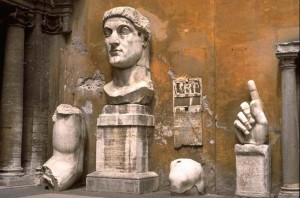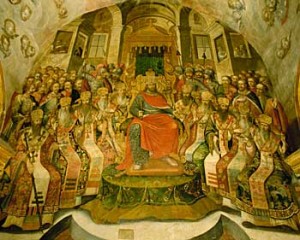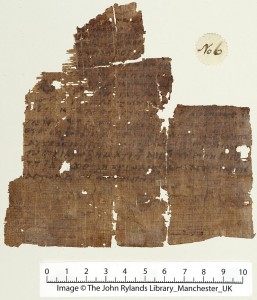Today is my son’s birthday so I am commemorating his birth with a search into important/interesting events that took place on this day in history – the perfect gift any three year old would enjoy.
I am only going to focus on one or two things here since I plan on doing this again every year. I just hope that one day these events will be of interest to him and he will enjoy reading about them (because yes, I have this fanciful idea that my children will one day use my blog as a means of learning about the things their mother was interested in).
I suppose one of the most noteworthy July 25th historical events happened in 306 when Constantine became the first Christian Emperor of the Roman Empire, and consequently due to him Byzantium became Constantinople, a capital associated with Christianity. However, during his reign he did not persecute non-Christians (despite the religion’s exclusivity and intolerance of others) , attempting to undo the persecution Christians had previously faced during the times of polytheism. However, outside of his religious practices he was viewed quite differently between the Middle Ages and the Early Modern period. He was either glorified for bringing Christianity to Britain (despite that it was known there before), while others felt he was a tyrant. Even though a great deal about Constantine is known and easily accessible, there are tons of details that have remained obscure due to historians and/or theologians who appear to have wanted to make something of him which he was not – he was not British by birth, his mother was not British by birth much less a princess, his first wife and son probably did not have an incestuous affair, and the list of personal anecdotes thus continues.
(Constantine from the Basilica Nova, Rome)
However, another point in his life is actually relevant to this post as Constantine called the First Council of Nicaea in 325, which met for roughly two months and ended on July 25th (technically it was August due to the calendar change, but for the purposes of this blog, I am not going to nitpick).
This was the first ecumenical council of the church and significantly the first attempt at reaching consensus through assembly – a practice that has since continued. Three important outcomes were derived from this first meeting. First (and the main reason the council was called), was to settle the question of the Son in relationship to God. It was ultimately decided that God and Christ were one and the same, and the Son was not in fact a created being from God, but rather divine onto himself. Second, the Council attempted to establish a set date for Easter, however their failure in this regard set the precedence of Easter as a moveable feast which is celebrated according to a perpetual calendar where it falls on the first Sunday after the first full moon in spring (a season that starts with the vernal equinox on March 21). So Easter can happen at any time between March 22 and April 25. All other moveable feasts depend upon the occurrence of Easter. Third, the council wrote the Nicene Creed, which has since been accepted by almost every denomination of Christianity (and here I am referring to the one from 325, not the later one of 381 at Constantinople – also, I am not going to address the controversy between these two creeds here). In short, the creed is a profession of faith and was written as a method of creating a uniform definition of the doctrine of Christianity.
Nevertheless regardless of religious belief, I think what is so beautiful about the creed is that despite its brevity and simple style, it is exceedingly clear and concise. Early Church Texts has the creed in the original Greek, Latin, and English.
(18th Century painting, The Council of Nicaea as it hangs at the Gate Church of the Trinity in Kiev)
(Oldest extant manuscript of the Nicene Creed dated from the 5th Century. Rylands Library, Manchester UK)
So while Constantine, his councils, and edicts didn’t necessarily bring Christianity to places it had not been known, he definitely widened its support, paving the ways for others (most notably in the 5th Century) to turn Christianity into a mainstream religion so that many others would later have something to write about and hand down the numerous manuscripts we all love today.


